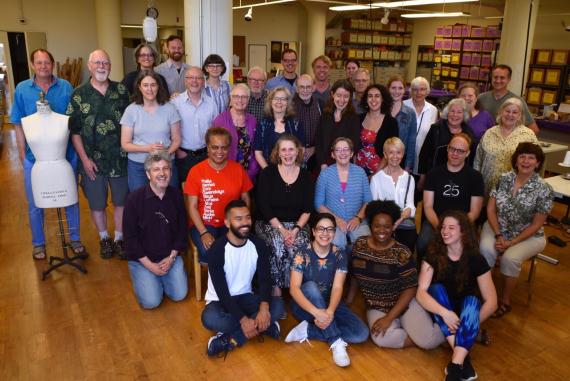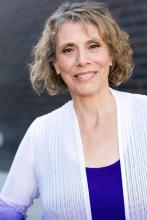From Judy Shahn:
I have crossed the threshold. I am now officially retired from the School of Drama after 26 years. Actually, “retired” isn’t really accurate. As some wise friends coined it, I am “L.A.” (Leaving Academia).
If you know the School of Drama, you know Sue Bruns. Sue is the Graduate Programs Advisor and lucky for us, she can advise on many other things we need on a daily basis. Evidently, she added up that I have taught 251 actors during my time in the PATP (Professional Actor Training Program)! Here are some of the things I look back on:
- Over the years, besides teaching the graduate actors, I had the pleasure of occasionally teaching undergrad classes in Voice, Shakespeare, and Dialects.
- I was a guest lecturer for Drama 101. Since I don’t lecture, I remember getting the room of 250 students to do text from Greek plays in a chorus!
- I directed six productions: a Noel Coward, two contemporary Canadian plays (although one was based on Richard III), two Shakespeare (As You Like It and Othello), and one devised work called Humor Me.
- I had the pleasure of acting in three productions: Mephisto (directed by Susan Finque long before she was a student), The Last Witch, and this season’s The Cradle Will Rock.
I was hired in 1990 on a one-year contract to replace Betty Moulton, who had gotten a last-minute job in her native Canada. I had been teaching voice and directing plays at Cornish College of the Arts for four years, but I only had a part time position. I was thrilled to enter the walls of the University. It was such a gift to work so intensively with a small group of actors over three years. The task of moving them forward from year to year, of guiding actors to free their voices, speak clearly, speak in dialects, and handle poetic text evolved many times over the years. I had the opportunity to test out my ideas and adjust them. My colleagues in the PATP were equally hungry to train actors, not only to work in the profession, but also to be self-generating creative artists. Finding your voice is one thing, but what you have to say with that voice is quite another. This became the theme of my teaching.
My colleagues in the PATP were equally hungry to train actors, not only to work in the profession, but also to be self-generating creative artists. Finding your voice is one thing, but what you have to say with that voice is quite another.
The PATP faculty began as three full-time teachers with about five adjunct teachers and then the core faculty began to grow. One of the joys of teaching in the PATP was collaborating with Cathy Madden (Alexander technique in performance) who doubled with me in Voice and Dialects. We quickly learned that with both of us in the room, we could help the students understand the messages of efficiency of effort and effective ways of using the whole self.
Originally, I started out teaching both Voice and Speech. Then, I taught only voice and we had several part-time speech teachers over time. Finally, Steve Pearson had the idea that Scott Hafso could teach speech in addition to singing. It was so great to work with Scott knowing we were two sides of the same coin. Although we are uniquely who we are as teachers, we had so much in common when it came to understanding breath and voice and this gave a unified message to the students.
In my time, there were four different heads of the PATP: Jack Clay, Steve Pearson, Mark Jenkins, and Valerie Curtis-Newton. Each one brought their own vision to training actors and directors. I have to thank Val for being the one to rein us in. We were so used to teaching an overload we hadn’t realized the detrimental effect it had on us. Val insisted on curbing burn out by having our schedules match more closely to other faculty in the University. Three Executive Directors changed the school of Drama during my time: Barry Witham, Sarah Nash Gates, and Todd London (in process!) Of course, Sarah was there the longest and had a lasting effect on me. Her loss this year affected us all deeply. I hold her memory deep within me. It is impossible to walk down the halls of Hutchinson or sit in the Jones Playhouse without picturing Sarah’s relish for her work coming through her knowing smile. As with any program, faculty come and go as do staff. Now, I join them with my exit.
Of course, [of the Executive Directors] Sarah was there the longest and had a lasting effect on me. Her loss this year affected us all deeply. I hold her memory deep within me. It is impossible to walk down the halls of Hutchinson or sit in the Jones Playhouse without picturing Sarah’s relish for her work coming through her knowing smile.
One thing I have not counted up is the number of productions I have coached, though I suspect it is well over 50. One that stands out is Andy McGinn’s production of Pentecost, which had not only a myriad of dialects, but several languages as well. We began working on it a quarter in advance in order to prepare the students. It was such a huge job that we hired two assistant dialect coaches. There were plays in British, Irish, Southern, New York, Scottish, African American, Russian, Romanian, Italian, Japanese, and many other accents. Speaking of dialects, one of my favorite on-going memories was “breakfast in dialect” with the second-year PATP students. We’d go to Portage Bay (before that, it was I-Hop) and the students would have to speak in a particular dialect during the entire breakfast. Other field trips included going to the big theatres in town; practicing voice and learning about acoustics in those spaces. In the spring, we’d walk to The Sylvan Grove, on campus to practice Shakespeare outdoors.
Along the way, I had the opportunity to teach at the School of Business, School of Law, and Humanities departments. I led drop-in singing sessions and drop-in read–a-Shakespeare-play sessions. I participated in many fundraisers, both for students’ showcase and for the School of Drama. My favorite ones were the dialect parties, which was an auction item. People would purchase a dinner party and I would teach them a dialect during the evening. The food matched the country of the dialect and we had ridiculous amounts of fun improvising in another accent.
As a School, we lived through the OJ Simpson Trial, 9/11, the election of President Obama (we watched his swearing-in together on TV) and, of course, the recession, which hit us hard. On a more personal level, as a mentor to students, I’ve supported students through illness, addiction, death in the family, and many other life changing events. Through it all, the text was an anchor. “A sonnet a day keeps the therapist away,” Kristin Linklater used to say. (The Linklater method has been the core and basis of the voice training for the PATP.) The whole first year, we worked on poetic text. A friend of mine introduced me to a book called Saved by a Poem by Kim Rosen and Eve Ensler. The authors describe poetry as “a companion through difficulty; a guide when you are lost; a salve when you are wounded; and a conduit to an inner source of joy.” Indeed poems can have the power to do all that. A former student, now a New York actor, recently wrote me about how she still revisits those first-year poems in times of trouble. The students chose works by established poets as well as writing some poetry and prose of their own. Words carry out our experience if we let them. If we let the words act on us, and allow ourselves to be transported, they will inevitably take us somewhere unexpected. It’s as if we are the conduit for words. They can transform us and, consequently, transform our audiences. I love the theatre for creating the space to do that.
Words carry out our experience if we let them. If we let the words act on us, and allow ourselves to be transported, they will inevitably take us somewhere unexpected.
Where do I take all of this richness and experience? I’ve been building my business, Vibrant Speaking. It turns out all of this actor training is really useful to lawyers, business people, public speakers, and anyone who wants to find freedom in their own expression. I plan to continue coaching in Seattle’s professional theatres. I want to audit classes on campus, particularly in History and Literature. I’d love to continue acting and singing. Perhaps, I’ll begin a community choir. I am looking forward to directing a performance piece at The Ida Culver Senior Center using verbatim stories of the seniors. Two of our graduates will perform with them. Traveling is definitely in the cards, and my husband and I already have plans to take off and explore as much of the world as we can manage. Oh yes, and did I mention going to the gym regularly?
Thank you School of Drama, for the richest years of my life. It’s time for a change. I wish you all the best, both to past and current students. I’m so grateful to the staff for all of their help. Sue Bruns, I will miss our daily conversations! Here’s to a smart and compassionate faculty. Our DNA is forever entwined. To Todd: Enjoy the ride. You are a born leader.
Farewell for now –
Judy Shahn
Senior Lecturer Emeritus


